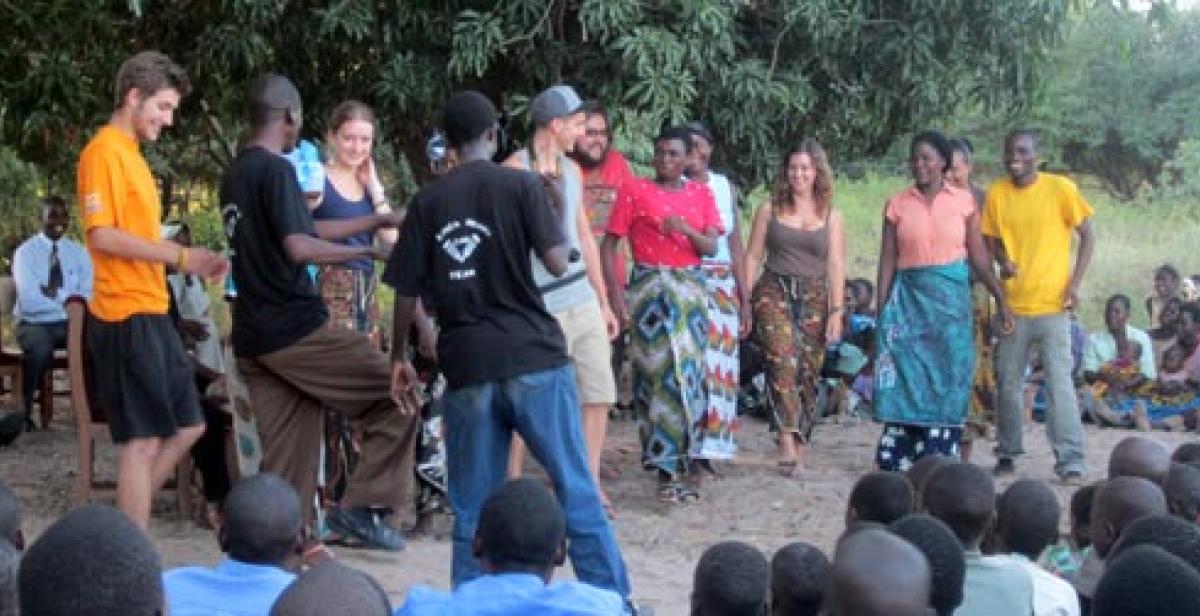On the first day of the eagerly anticipated placement we endured a teeth rattling drive down dusty dirt tracks to meet the people of Damba, the first village we would be working alongside. We were greeted warmly by the village head man. The group then divided into two, one with Dan and one with Mphatso, who work for partner organisation SWAM (Society of Women Against AIDS in Malawi). After a brief tour of the village, each group conducted research into village politics, economics and cultural practices to enhance our understanding and begin to build rapports.
After meeting the villagers of Damba, the group was invited to observe and take part in a STAR Circle meeting (STAR stands for Society Tackling AIDS through Rights). The STAR Circle meetings are a fairly recent initiative implemented by SWAM, in which locals congregate once a week to share experiences of HIV/AIDS – effectively a group counselling session for the people.
Following a good song and dance, the meeting commenced, adopting a serious yet focused approach. The group discussed major contributing factors to which contraction or transmission of HIV/AIDS is a consequence. They then split into groups to distinguish which were cultural and non-cultural practices. This activity was especially informative to us to highlight the issues in gender equality.
Later that week, the group visited a fishing village on the lake shore. After making our way along the beach through mango-tree canoes, we interviewed the local fishermen and their wives about their position and opinions on polygamy and HIV/AIDS.
In the second part of the day we met up with a local drama group, who produce and perform scenarios to the public in which they address HIV/AIDS, gender equality and human rights. Members of our team received scripts in Chichewa as they will perform with the group.
In the second week, we visited a local school in the village, to meet with the Headmaster and teachers. We were very interested in the curriculum, especially the life skills class in which HIV/AIDS awareness is taught. The teachers were extremely helpful and more than happy to facilitate a proposed sports event, as well as contributing to a life skills class.
When we had managed to say goodbye to hundreds of exceptionally inquisitive children, we attended a meeting with religious leaders from surrounding churches and mosques. We were pleasantly surprised at the turn out and enthusiasm to participate in the discussion, considering the prolifically concrete and controversial stances some of the leaders held on the topics. We gathered beneath a mammoth mango tree, that we dubbed ‘the tree of knowledge’, whose truly idyllic presence inspired discussion. After two hours of questions and answers, the group was satisfied with the information received, although the leader’s opinions on condoms were still firm. We were all elated with research gathered on which to base a strategy.
The following day, we had the opportunity to orchestrate and deliver training on gender equality and human rights to the village of Zidyana, which the group were itching to provide. We prepared a number of different activities for the villagers to get stuck into, but word had obviously spread because the anticipated number of participants had trebled. Unfazed, we continued regardless, receiving a pleasant welcome, and we began the activities. One of the activities consisted of getting the group to match hobbies, to see which would be associated with which gender. Preconceptions were broken when we revealed the answers.
At the end of the week, a meeting with influential members of the community was arranged. The same religious leaders and village head men were all in attendance as well as a vast number of people from both Damba and Zidyana villages. Again, we met under ‘the tree of knowledge’ to conduct the discussion. A massive divide between male and female was evident, both through their mentalities and as they were physically in front of us. The debate reached boiling point at times due to conflicting views, but the nature of the villagers allowed it to continue healthily and effectively. We fulfilled the objective of the discussion by facilitating a productive and passionate meeting.
By Progressio ICS volunteer Jac Pearson
Photo: Jac’s group with the local drama group (photo taken by Progressio ICS Project Officer Cecilia Rose)




Comments
It is always good to debate
It is always good to debate things and for people to really allow their true feelings to come out, as long as it is done in a healthy manner. There is a lot that we can learn and change.
People should always be allowed to express their views on the tidal wave even if they don't line up with what others feel because everyone is different.